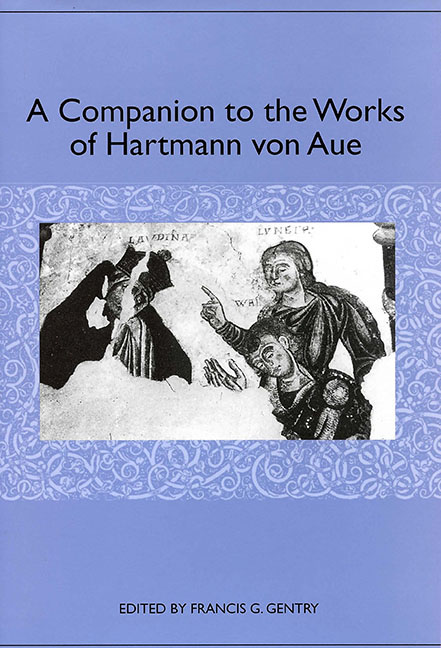Book contents
- Frontmatter
- Contents
- Acknowledgments
- Introduction
- Hartmann's Theological Milieu
- Hartmann von Aue as Lyricist
- Hartmann von Aue and Chrétien de Troyes: Respective Approaches to the Matter of Britain
- Gender and Love in the Epic Romances of Hartmann von Aue
- The Two-Fold Path: Erec and Enite on the Road to Wisdom
- The Body in Pain in the Works of Hartmann von Aue
- Illness and Cure in Hartmann von Aue's Arme Heinrich and Iwein
- Hartmann's Legends and the Bible
- Hartmann's Works in the Visual Arts
- The Medieval Literary Reception of Hartmann's Works
- A Tale of Sacrifice and Love: Literary Way Stations of the Arme Heinrich from the Brothers Grimm to Tankred Dorst
- Editions and Translations of Hartmann's Works
- Works Cited
- Notes on the Contributors
- Index
Introduction
Published online by Cambridge University Press: 27 April 2017
- Frontmatter
- Contents
- Acknowledgments
- Introduction
- Hartmann's Theological Milieu
- Hartmann von Aue as Lyricist
- Hartmann von Aue and Chrétien de Troyes: Respective Approaches to the Matter of Britain
- Gender and Love in the Epic Romances of Hartmann von Aue
- The Two-Fold Path: Erec and Enite on the Road to Wisdom
- The Body in Pain in the Works of Hartmann von Aue
- Illness and Cure in Hartmann von Aue's Arme Heinrich and Iwein
- Hartmann's Legends and the Bible
- Hartmann's Works in the Visual Arts
- The Medieval Literary Reception of Hartmann's Works
- A Tale of Sacrifice and Love: Literary Way Stations of the Arme Heinrich from the Brothers Grimm to Tankred Dorst
- Editions and Translations of Hartmann's Works
- Works Cited
- Notes on the Contributors
- Index
Summary
In 1973 the great British medievalist, Maurice O'C. Walshe, within the context of a lecture on Wolfram von Eschenbach and Gottfried von Strassburg, stated: “It is a fact, I think, that most modern readers find themselves temperamentally drawn to either Wolfram or Gottfried, perhaps to an extent which renders it difficult for them to do justice to the other” (258). In a sense Walshe was echoing what Hugo Kuhn had observed in 1953 about Hartmann:
Hartmann von Aue ist der am meisten vernachlässigte unter den Dichtern unserer mittelhochdeutschen Blüte um 1200. … Die Liebe der deutschen Philologen gehört seit je Parzival und Tristan, dem Nibelungenlied und Walther von der Vogelweide. (11–12)
I do not mention these statements out of some eccentric, antiquarian interest or even a desire to point readers in the direction of what are two very good essays, but to indicate that at the time of publication of Walshe's lecture four years later in 1977 — let alone in 1953! — one would have been hard put to find scholars who would have said that they were “temperamentally drawn” to Hartmann von Aue. However, Elfriede Neubuhr's substantial Bibliographie zu Hartmann von Aue, also published in 1977, would seem to belie that assertion. For as the publication of G. F. Benecke and Karl Lachmann's edition of Iwein (1827) and Benecke's Wörterbuch zu Hartmanns Iwein (1833) illustrate, the fascination with Hartmann has in fact existed from the beginnings of medieval German philology in the nineteenth century. Indeed, the names of the scholars who conducted Hartmann research during this period read like a Who's Who of the heyday of German philological research. In addition to Benecke and Lachmann, scholars such as Karl Bartsch, Jacob Grimm, Wilhelm Grimm, Hermann Paul, Edward Schröder, and Hendricus Sparnaay, to name but a few, all contributed significant studies. Further, as the essay by Rüdiger Krohn in this volume shows, Hartmann's Arme Heinrich was a favorite object of creative reception throughout the nineteenth and twentieth centuries, as were his other works (Grosse/Rautenberg, 47–67). And yet, this most prolific and interesting medieval German poet — yes, I admit it: I am temperamentally drawn to Hartmann — has suffered from benign scholarly neglect until relatively recently.
- Type
- Chapter
- Information
- A Companion to the Works of Hartmann von Aue , pp. 1 - 8Publisher: Boydell & BrewerPrint publication year: 2004



